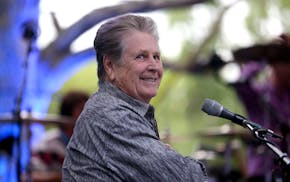With the Beach Boys, Brian Wilson created some of sunniest and giddiest music in the history of pop. He also crafted some of the saddest. How would he play his first Christmas show?
That's how I began my review of Wilson's inaugural holiday tour, which was in Minneapolis at the Orpheum Theatre in 2018.
It was far from jingle all the way. In fact, it had all the makings of a blue Christmas, and it's not because the songs were sad. Being in the presence of a genius is one thing but being entertained is another. If Christmas is about comfort and joy, then Wilson seemed uncomfortable and unjoyful.
Wilson, whose death at age 82 was announced Wednesday, was a musical genius. It's long been said. Those words appear next to his name practically as often as the name of the group he made world-famous, the Beach Boys.
Wilson created glorious mini-symphonies about summer fun — surfing, driving sports cars or just connecting with girls — as well as sometimes exploring more introspective and darker themes. Tunes like "Good Vibrations" and "Wouldn't It Be Nice," among many, have not only stood the test of time but showcase his mastery of the recording studio in layering vocal harmonies and crafting arrangements for instruments as eccentric as a theremin or as common as a full orchestra. He composed the music; others wrote the lyrics that Wilson or his cousin Mike Love sang in the Beach Boys.
But there was another side to Wilson. Mental illness. Wilson was a tortured soul. Maybe it was because of abuse from his demanding father Murry, maybe it was because of his experimenting with LSD in his youth, maybe it was because of the controversial therapy techniques of Dr. Eugene Landy in adulthood. Maybe it was because of the voices he heard in his head. Maybe it was just inexplicable depression.
I rode in an elevator with Wilson backstage at a Minneapolis concert in 1999. He stood statue-like, staring straight ahead, silent, lost in his own world. It was the same Buddha-like presence he had onstage, sitting rather motionless at the grand piano, turning his good ear to the band (he was deaf in his right ear), reading the lyrics off a teleprompter.
When I interviewed Wilson by phone in 2016, I apparently caught him on a good day. Unlike our previous chats when he offered short, almost rote comments, this time he sounded enthusiastic, cheery, happy even.
On a 10-point scale, how happy is he?
"I'm at 10," Wilson said without hesitation.
He was happy because he was on tour making music, re-creating in entirety the album "Pet Sounds," his masterwork from 1966.
Wilson spoke in simple, declarative sentences. He spoke haltingly. He rarely elaborated. He seldom mustered enough steam for a full paragraph. He could seem flat, like someone who has had a stroke.
In person, he seemed the same way. Maybe that zombie-like presence was because Wilson, a high school quarterback who started singing professionally back then, suffered from stage fright. He told me he never gets over stage fright "till the music starts. As soon as I hear the band, I'm good."
When I interviewed Wilson by phone in 1999 for his first solo tour behind the album "Imagination," he called a piano his lifeline. He seemed a bit nervous, and uttered "scared" or "scary" at least 10 times and "crazy" almost half as many times in a 25-minute conversation.
At Wilson's 2004 U.S. concert premiere of "Smile," the Beach Boys' legendary unreleased 1967 album, again at the Orpheum in Minneapolis, his countenance changed after his listless performance of Beach Boys favorites. Suddenly, for the "Smile" portion, there was a gleam in his eyes and the expressionless figure started dancing on his piano stool. Wilson was not only very in the moment but he also seemed to be transported back to the studio in '67, hearing all those sounds of "Smile" in his head and just hoping his musicians would play them just right.
Minnesota mother
Many books have been written about the Beach Boys and some specifically about Wilson. He decided to pen his own memoir, "I Am Brian Wilson," with Ben Greenman, in 2016 "because I wanted people to know about my life. People are interested in some good trivia."
Trivia: His mother, Audree Korthof, was born in Minneapolis.
Does he have any relatives in Minneapolis? Any Minneapolis roots?
"I don't know," he told me. "I never found out."
Wilson said the success of the 2014 biopic "Love and Mercy," made by Minnesota filmmaker Bill Pohlad, "got me inspired to tell my life story."
In that 2018 interview, I breezed through 35 questions in a fast 15 minutes.
Wilson said he didn't mind being called a genius. "I'm very proud," he said. "I don't know what genius means."
Asked how he wanted to be remembered, he replied in his typically understated, simplified manner: "As a great singer."
Remember Wilson for the good vibrations. Remember him for the fun, fun, fun and the possibilities. Remember him for being hopeful and wishful and telling us "wouldn't it be nice if we…" fill in your own blank.

Review: Pianist Bruce Liu delivers a spirited Prokofiev concerto with the Minnesota Orchestra

John Gorka, one of Minnesota's greatest folk singers, has a problem with Bob Dylan movie

Minnesota musician dads remember their kids' first concert

Our critic remembers musical genius Brian Wilson — and his Minnesota connections

